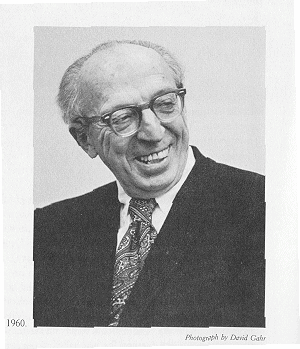
Aaron Copland Quotations
Aaron Copland’s life and music spanned the 20th century and he was considered by most to be America’s most ‘American sounding’ composer. In addition to superb use of melody, open rich harmony and dynamic wide-ranging rhythmic interplay, Copland composed from the heart as well as with technical prowess.
When we hear his “Fanfare for the Common Man,” we can’t help but to feel deeply moved through the sheer beauty and heartfelt poignancy of his musical language. He championed performances of his own work as both a conductor and a pianist, appearing with a great many symphony orchestras throughout his long career. Even so, many other great conductors including Serge Koussevitzky of the Boston Symphony, Eugene Ormandy of the Philadelphia Orchestra and Leonard Bernstein of the New York Philharmonic often performed and recorded Copland’s music.
One interesting observation: Copland’s music, which for many evokes pastoral and patriotic American themes due to titles like Billie the Kid, Rodeo, Appalachian Spring, Fanfare for the Common Man and Lincoln Portrait, Copland himself doesn’t fit the stereotype of the kind of man who would compose such music. He was born in Brooklyn, New York, lived most all his life there, was a Jew, was said to be a gay man, and was accused of being a communist (the accusation was eventually dismissed due to no evidence after 20 years of FBI investigation). For us, this goes to show that the shallow stereotypical notions of what an American patriot might look like can be wrong. It is good to remember this next time you are stirred with patriotic feelings as you listen to Aaron Copland’s music. His deeply moving American music was written by a true American, a Jewish, cosmopolitan, homosexual and politically left man, who may have best captured the spirit of America for all of us to appreciate… now and for generations to come.
Image: Photograph of composer Aaron Copland
“You compose because you want to somehow summarize in some permanent form your most basic feelings about being alive, to set down… some sort of permanent statement about the way it feels to live now, today.”
“If a literary man puts together two words about music, one of them will be wrong.”
“There is something about music that keeps its distance even at the moment that it engulfs us. It is at the same time outside and away from us and inside and part of us. In one sense it dwarfs us, and in another we master it. We are led on and on, and yet in some strange way we never lose control.”
“When I speak of the gifted listener, I am thinking of the non-musician primarily, of the listener who intends to retain his amateur status. It is the thought of just such a listener that excites the composer in me.”
“Listening to the Fifth Symphony of Ralph Vaughan Williams is like staring at a cow for forty-five minutes”“Inspiration may be a form of super-consciousness, or perhaps of sub-consciousness… I wouldn’t know. But I am sure it is the antithesis of self-consciousness.”
“To stop the flow of music would be like the stopping of time itself, incredible and inconceivable.”
“So long as the human spirit thrives on this planet, music in some living form will accompany and sustain it and give it expressive meaning.”
“The whole problem can be stated quite simply by asking, ‘Is there a meaning to music?’ My answer would be, ‘Yes.’ And ‘Can you state in so many words what the meaning is?’ My answer to that would be ‘No.’”
“I think that my music, even when it sounds tragic, is a confirmation of life, of the importance of life. If there is a unifying core in it all, it is a sense of affirmation.”
“Life seems so transitory! It is very attractive to set down some sort of permanent statement about the way we feel, so that when it’s all gone, people will be able to go to our art works to see what it was like to be alive in our time and place – twentieth-century America.”
“I have never known a public concert of a variegated make-up that wasn’t enlivened by ten minutes of controversial music. Even those who are sure to hate it are given something to talk about.”
“A great symphony is like a man-made Mississippi down which we irresistibly flow from the instant of our leave-taking to a long foreseen destination.”
– Aaron Copland (1900 – 1990)